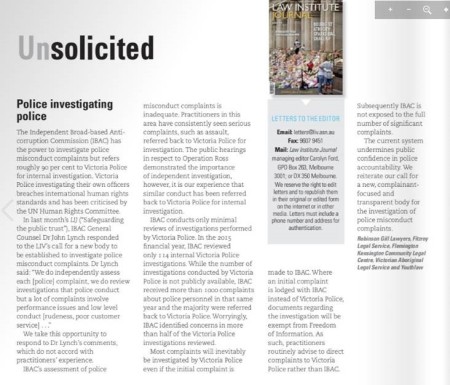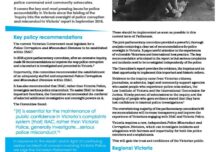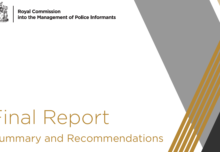Police investigating police
Legal practitioners have responded to an article by General Counsel of of the Independent Broad-Based Anti-Corruption Commission(IBAC), that was published in last month’s Victorian Law Institute’s Journal.
IBAC has the power to investigate police misconduct complaints but refers roughly 90% to Victoria Police for internal investigation.i Victoria police investigating their own officers breaches international human rights standards and has been criticised by the UN Human Rights Committee.ii
In last month’s Law Institute Journal, the General Counsel of IBAC, Dr John Lynch, responded to the LIV’s call for a new body to be established to investigate police misconduct complaints.
Dr Lynch said:
“We do independently assess each [police] complaint, we do review investigations that police conduct but a lot of complaints involve performance issues and low level conduct [rudeness, poor customer service]…”
We take this opportunity to respond to Dr Lynch’s comments, which does not accord with practitioners’ experience.
IBAC’s assessment of police misconduct complaints is inadequate. Practitioners in this area have consistently seen serious complaints, such as assault, referred back to Victoria Police for investigation. The public hearings in respect to Operation Ross demonstrated the importance of independent investigation, however, it is our experience that similar conduct has been referred back to Victoria Police for internal investigation.
IBAC conducts only minimal reviews of investigations performed by Victoria Police. In the 2015 financial year, IBAC reviewed only 114 internal Victoria Police investigations.iii
Whilst the number of investigations conducted by Victoria Police is not publicly available, IBAC received over 1,000 complaints about police personnel in that same year iv and the majority were referred back to Victoria Police. Worryingly, IBAC identified concerns in more than half of the Victoria Police investigations reviewed.v
Most complaints will inevitably be investigated by Victoria Police even if the initial complaint is made to IBAC. Where an initial complaint is lodged with IBAC, instead of Victoria Police, documents regarding the investigation will be exempt from Freedom of Information vi. As such, practitioners routinely advise to direct complaints to Victoria Police rather than IBAC. Subsequently IBAC is not exposed to the full number of significant complaints.
The current system undermines public confidence in police accountability. We reiterate our call for a new, complainant-focused, and transparent body for the investigation of police misconduct complaints.
Robinson Gill Lawyers,
Flemington Kensington Community Legal Centre,
Victorian Aboriginal Legal Service &
Youthlaw
Fitzroy Legal Service
i ‘Policing the police’ (2014) 11 Law Institute Journal 14.
ii See Covenant Against Torture and Other Cruel, Inhuman or Degrading Treatment or Punishment, International Covenant on Civil and Political Rights and Human Rights Committee, Views: Communication No 1885/2009, 110th sess, UN Doc CCPR/C/110/D/1885/2009 (27 March 2014) (Horvath v Australia)
pcl_devel_16300ra_335.docx
iii IBAC Special Report on Police Oversight (August 2015), p 5.
iv IBAC 2014/2015 Annual Report, p 17.
v IBAC Special Report on Police Oversight (August 2015), p 5.
vi Section 194 Independent Broad-Based Anti-Corruption Commission 2011 (Vic) exempts documents from being accessed under the Freedom of Information Act 1892 where they relate to a complaint received by IBAC. Victoria Police rely upon this provision and refuse to provide documents through FOI where the initial complaint was received by IBAC, even if the subsequent investigation was by Victoria Police. No such exemption applies where the initial complaint was made directly to Victoria Police.





